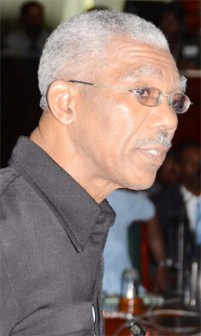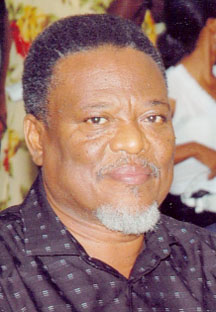Leader of the Opposition David Granger yesterday said APNU has not sold out Linden in brokering an agreement on a number of measures, including electricity subsidies and liberalising the airwaves, as tempers run high in the mining town.
Granger, in an impromptu press conference last night at the Public Buildings, said he asked Prime Minister Sam Hinds to give Linden a longer time table for the phasing out of subsidised electricity, while defending main opposition APNU’s decision to sit down with government and saying that Linden will be better off for it.
Protests have been ongoing in Linden since the budget presentation signalled an end to the subsidies, which last year cost government some $2.7 billion.

“I have asked the Prime Minister to give us a time table over a long period of time. We’re talking about maybe two years or so, but there is not going to be sudden spike and that is not our agreement,” said Granger in an interview with reporters last night.
Joint talks between APNU and the government on Wednesday yielded an increase in the old age pension to $10,000 along with the opposition coalition’s decision to withhold support for the AFC’s move to cut public spending.
Prime Minister Hinds, speaking during the budget debates last week Wednesday, said government will from July 1 calculate the monthly electricity bill of Linden customers, in accordance with the GPL tariff and halve it, so that customers in Linden pay only half of the rest of the country pays. Bauxite pensioners will receive the first 100 kilowatt hour at no charge and they will pay according to the tariff for any consumption that exceeds this.

This decision sparked a series of protests in Linden culminating in a shutdown of the entire town on Wednesday.
Both the AFC and APNU made their presence felt in Linden yesterday to quell the disquiet among the residents, who are agitated by the news of the increase.
Granger said that that there is no deal to accept the imposition of the tariffs. “What we did arrange with the administration is to advance the interest of the Linden people and these were the problems that were articulated by the Lindeners, so there is no deal to accept a quid pro quo. It’s not a deal to accept the tariffs for the implementation measures,” he said.
“These measures are the people’s rights. People have a right to a healthy environment and the removal of the dust, people have a right to television stations and these measures are going to be put in place, and then when we feel that Linden is on its feet, when the Lindeners themselves are capable of living proper economic lives, because of the damage that has been done in that community, then we’ll consider the introduction of the tariffs,” Granger said.
Further, he said that people are ignoring the fact that the Prime Minister said the increase would be gradual. “It is not going to be done next week or next month. It will be done when certain other measures, like the package that Mr. (Renis) Morian spoke about, when those measures are put in place and will be done selectively, that is, the persons who use less electricity will pay less,” he said.
“That will not happen soon, it will happen over a long period of time and we’re looking at that period of time and the Prime Minister is looking at the schedule for the implementation of those measures. What we need to do for the budget, these talks arose out of the budget and we need to identify the sources of funding to make up for the short fall, that is what he’s going to be looking for, but I do not see that the tariffs will be implemented until the other measures are put in place,” Granger said. “Linden’s future is guaranteed by the position that APNU took,” he added.
‘No deal’
Parliamentarian for Region Ten, Renis Morian said that there was need to clear the air about the misinformation about the meeting between the President and Granger.
He said that there was no “deal” struck.
“What APNU did is sat down with the Prime Minister and officials and looked at a menu of measures, things that the people in Region Ten have asked APNU to get involved with; first of all BOSAI dust, Funding for Linden Economic Network. We looked at a number of other things apart from the television station more pointedly,” said Morian.
“Our statement to the Prime Minister is a simple one; we’re looking to see all of these measures implemented first before we can even move forward to get an agreement as it relates to the increase in tariffs in Region Ten. And this could take two years plus. And at the same time we are saying that no increase in tariffs will be beyond the reach of the people in Region Ten, and that is our position,” Morian said.
Meanwhile, Prime Minister Hinds said in Parliament yesterday that discussions revolved around the ongoing huge subsidies with a view to cushioning the impact of cost recovering electricity tariffs on people, taking into consideration the special historical circumstances of Linden.
“Today’s discussion… focused on Linden and what could be done to ease and make good the transition of Linden into a regular Guyanese town, and the greater inclusion and participation of all of Region 10 into the programmes and fortunes of Guyana as a whole; more specifically the matter of Linden electricity tariffs, along with other issues relating to Linden, were discussed,” he said.
He said that in relation to electricity tariffs, it was agreed that alignment with the GPL tariffs and elimination of the Linden electricity subsidy was necessary. “It was also agreed that the tariff adjustment will proceed from 2012, guided by the principles of gradualism and selectivity, with the transition to the aligned tariffs being introduced in a differentiated manner that cushioned the impact on the most vulnerable consumers,” Hinds explained.
Approached for a comment last night, Hinds disputed Granger’s interpretation of the meeting and said that his (Hinds) statement on the issue in Parliament yesterday was a faithful summary of the meeting between Granger and the President. Hinds said that the issues which Granger signalled were prerequisites for a tariff increase were more like a package of things to be worked on.
Hinds said that it is still to be decided exactly how the increase will be implemented, since there is talk about merging certain areas in Linden or introducing certain classifications. “We will look at various ways,” Hinds said, regarding the manner in which the new rates will be introduced. He insisted, however, that the new rates that the residents will pay are also subsidised.
Hinds, in a letter published in the press on Wednesday, said that while Lindeners will pay half of what the rest of the country pays for electricity from July 1, 2012, they would not have to pay the full cost before the beginning of 2016, when hydro electricity is expected to be available.
Further, Hinds stated that Linden domestic customers consume over two times what domestic consumers, including pensioners, consume on the GPL grid. “The very low cost of electricity in Linden have long prevented any incentive for customers in Linden to reduce energy consumption and the consequent reduction in billing. There is the potential for significant reduction in consumption by linden consumers towards the averages in the GPL grid,” Hinds said.




